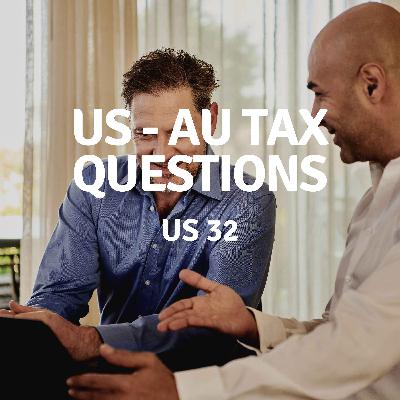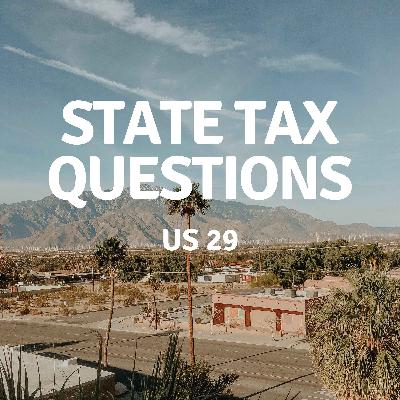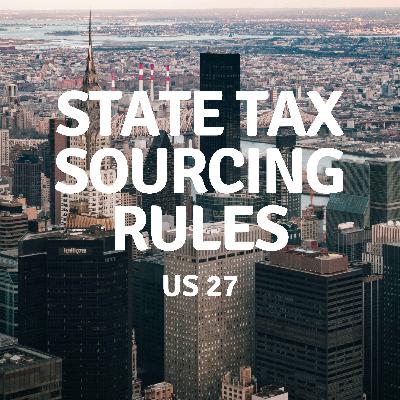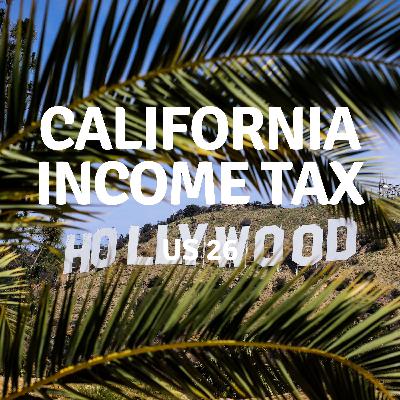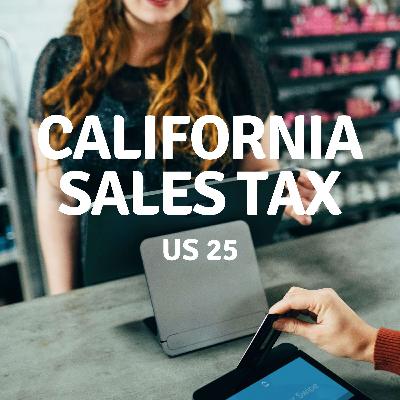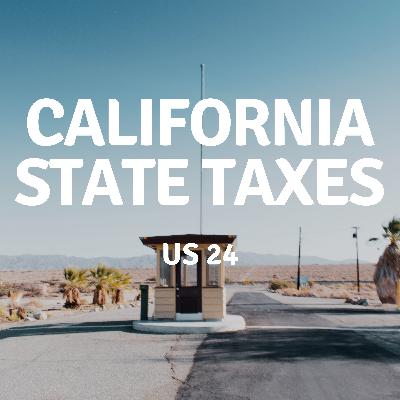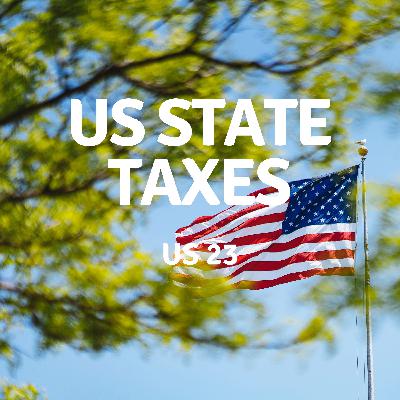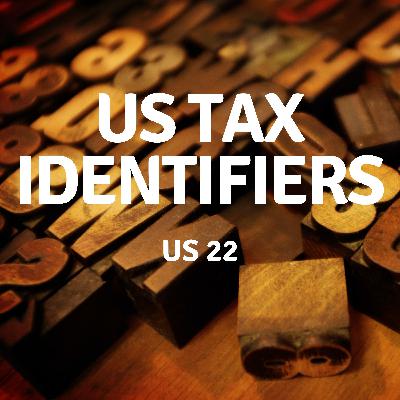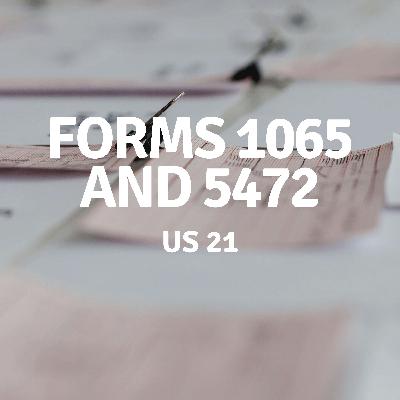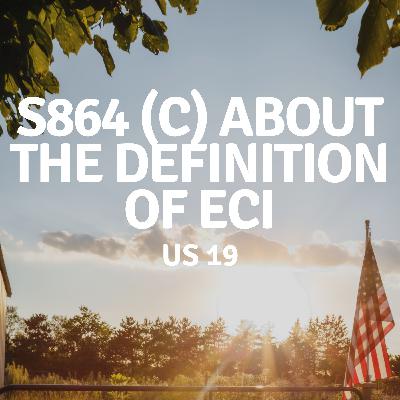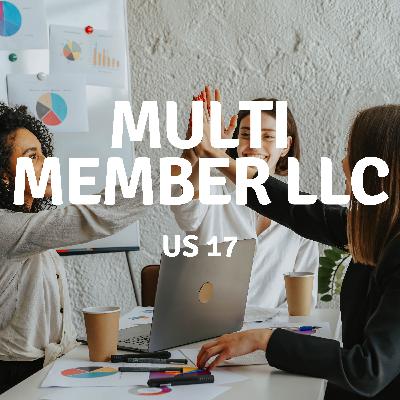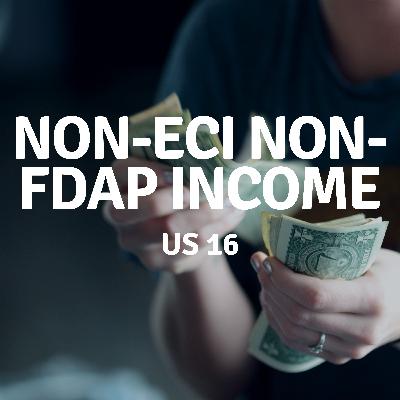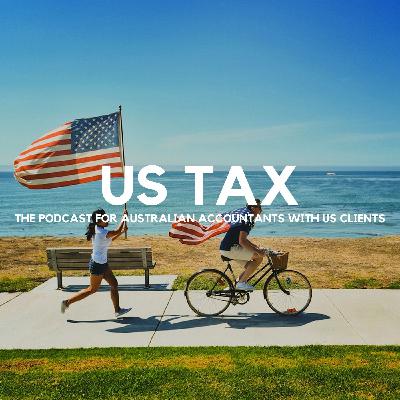Discover US Tax
US Tax

US Tax
Author: Heide Robson
Subscribed: 1Played: 16Subscribe
Share
© Copyright 2022 All rights reserved.
Description
The podcast for Australian accountants with US clients. Find the experts and information you need to optimise your clients’ cross-border tax position. Help your clients invest or expand from Australia into the US and from the US into Australia.
Hosted on Acast. See acast.com/privacy for more information.
33 Episodes
Reverse
Hosted on Acast. See acast.com/privacy for more information.
6 common questions and their answers Hosted on Acast. See acast.com/privacy for more information.
When your clients plan an expansion into the US, they will most likely ask you how to structure this. Should they just trade through their Australian entity? Or set up an entity in the US? Hosted on Acast. See acast.com/privacy for more information.
How you structure into US public and private markets depends on whether you invest for cash flow or capital growth. How should you structure your passive investments in the US? Set up a US entity or trade through your Australian entity? Hosted on Acast. See acast.com/privacy for more information.
There is a sharp distinction between the econcomic nexus for sales tax and the one for state income tax. Hosted on Acast. See acast.com/privacy for more information.
We already mentioned PL 86-272 a number of times in past episodes. Frances Ellington mentioned it and then also Ed Antolin. Today let’s drill deeper because losing the protection that PL 86-272 grants you, can cost you a lot of money in state income taxes. While PL 86-272 is federal law and so applies to all 50 states, let’s discuss the technical advice memorandum California’s Franchise Tax Board issued. Because California is trying to limit the application of PL 86-272 and chances are that other states will follow suite.And just one comment on the side: The state revenue office in California is called the Franchise Tax Board, in short FTB.The speaker in this episode is Edwin Antolin of Vallejo Antolin Agarwal Kanter, or in short VAAK, in Walnut Creek, California about California’s technical advice memorandum to PL 86-272. Hosted on Acast. See acast.com/privacy for more information.
Let’s talk about state tax sourcing rules. How do you determine which income is taxable in which state? If you sell into California but also into lots of other states, how do you determine what is taxable in California and what is taxable in other states? That is the question that Ed Antolin of Vallejo Antolin Agarwal Kanter, or in short VAAK in Walnut Creek, California will discuss with you.To determine which net income is taxable where, you look at sales. You determine the sales for each state. And then you apply that percentage to your net income. That portion of net income is then taxable in that particular state. But in addition - if a particular state has the throwback rule - then any net income in tax-free states is then also added to your taxable income in that state.What you do when you have sales in two states with a throwback rule. So let’s say you have sales in California and Colorado. Both states use the throwback rule. But then you also sell into Wyoming which has no state income tax. So the throwback rule applies. But which state gets that net income? California or Colorado?If a state has a throwback rule like California, the sales gets thrown back to the state from which the goods were sent. For example, if you store inventory in CA and sell to a customer in WY, the sales are thrown back to CA. So the state that gets the throwback is the state from which the inventory was sent.So in our example of California v Colorado. If the goods were sent from California, California gets to tax the Wyoming net income. And if the goods were sent from Colorado, then Coloardo gets to tax that income under the throw back rules since Wyoming has no income tax. So that makes it even more important to store your goods in a low tax state. Hosted on Acast. See acast.com/privacy for more information.
In US update 24 Frances Ellington already gave you a first overview of Californian income tax. In this update let’s drill deeper with Ed Antolin of Vallejo Antolin Agarwal Kanter, or in short VAAK in Walnut Creek, California.Just like with federal income tax, you have to distinguish between individual and corporate state income tax. So the first question to Ed Antolin is: what triggers corporate income tax in California? Only physical presence or is there - just like with sales tax - an economic nexus? Hosted on Acast. See acast.com/privacy for more information.
Until June 2018 US sales tax was relatively straight forward. States could only charge you sales tax if you had a physical presence in the state, like a shop or a warehouse.But then came the famous court case South Dakota v Wayfair, and there the Supreme Court decided on the 21st of June 2018 that the states were not limited to physical presence as a nexus, but could also charge sales tax based on an economic nexus. And so today pretty much all states charge sales tax - if they have sales tax - based on physical presence or an economic nexus. And so does California.California - it has a population of 40m people and the 5th largest economy in the world after the US as a whole, China, Japan and Germany, and more productive than India or the UK. So when your clients expand into the US, there is a high chance that a large part of their sales will be in California, and that puts Californian sales tax onto the table.The speaker in this episode is Edwin Antolin of Vallejo Antolin Agarwal Kanter, or in short VAAK, in Walnut Creek, California. Ed will walk through the pitfalls of Californian sales tax.In this episode we will also discuss the marketplace facilitator rules. 44 of the 50 states have implemented marketplace facilitator rules. And what this does it that it creates another nexus.So California just like any other state can only charge you sales tax, if there is a nexus to California, a connection between you and California. And this nexus can be a physical presence because you store inventory in California, it can be an economic nexus because your sales in California exceed $500k, but the nexus can also be established when you sell through a marketplace facilitator, like Amazon, Etsy, eBay, Walmart and the lot. Then this facilitator becomes the retailer and is hence liable for sales tax. However, Shopify is not a marketplace facilitator. So the marketplace facilitator rules don’t apply to Shopify and Woocommerce and other platforms where the shopfront is basically yours and the platform just provides the backend. Hosted on Acast. See acast.com/privacy for more information.
In this episode let’s look at California state taxes. Frances Ellington of GHJ Advisors in Los Angeles will give you a very helpful insight about Calfiornia sales and use tax, income and franchise tax.And listen out for Public Law 86-272. That law might exempt your clients from Californian state income tax, if they don’t have a warehouse in California, not from their filing obligations but from the actual tax. Hosted on Acast. See acast.com/privacy for more information.
For your Australian clients there is a high chance that US federal taxes are zero thanks to the double tax agreement with the US. But most US states don't consider these agreements, so while your client doesn’t pay any federal taxes in the US, they most likely still pay state taxes. So for your Australian clients US state taxes are often much more relevant.Frances Ellington of GHJ Advisers in Los Angeles will walk you through state taxes across the US. Nexus will play a big role. And you will be surprised how fragmented the US is around state taxes. From the outside the US looks like a unified country holding one flag and pursuing one goal. But when it comes to state taxes, the US feels more like the European union, each state running their own show. Hosted on Acast. See acast.com/privacy for more information.
No tax administration system works without tax identifiers. The ATO uses ACNs, TFNs and ABNs. The US uses SSNs, ITINs and EINs. Social security numbers (SSN) are used for tax purposes but also for social security. A social security number in the US is like an individual TFN plus a Centrelink’s CRN in Australia. SSNs are not relevant for us in Australia since most of us won’t be able to apply for an SSN. So we skip SSNs and instead focus on EINs and ITINs.ITIN stands for Individual Taxpayer Identification Numbers. And you can apply for an ITIN if you need one. Anybody who needs one can get one. You just have to send your passport by courier to an IRS agent in Australia, pay a fee, do a Zoom interview and you have an ITIN.EIN stands for Employer Identification Number. Without an SSN you can only apply by fax, phone or mail. The speaker in this episode is Alex Oware of O & G Accounting in Lakewood, Colorado. Alex will cover EINs and ITINs, and also W-9, W-8BEN and W-8BEN-E. And at the end Alex will also touch on branch profit tax. Hosted on Acast. See acast.com/privacy for more information.
As a multi member LLC, you have to file 1065, 5472, K1, K2, K3 as well as 8804 and 8805.For a foreign member of a multi member LLC there is 1065 and K1 and then possibly also K2 and K3 listing the income allocated to the partners and then 8804 and 8805 listing any tax that has been withheld.The speaker in this episode is Alex Oware of O & G Accounting in Lakewood Colorado. Hosted on Acast. See acast.com/privacy for more information.
Let’s look at s882 and 864 one more time.The term ‘limited force of attraction’ would make a good movie title, maybe a sequel to ‘The Accountant’. But putting Hollywood aside, The Limited Force of Attraction rule in s864 (c) (3) says that if you have a US Trade or business, then all your US sourced income is ECI. The speaker in this episode is Alex Oware of O & G Accounting in Lakewood Colorado. Hosted on Acast. See acast.com/privacy for more information.
In the last episode, we looked at s882 of the Internal Revenue Code which covers foreign corporations with a US Trade or Business. Today let’s look at s864 (c ) of the Internal Revenue Code, which defines effectively connected income (ECI).s864 is the definition section, and for us it is s864 (c ) that is particularly relevant since it defines effectively connected income. S864 (c ) has 8 paragraphs, but it is really only the first five that are relevant for us.1 - Number 1 basically just says that the following rules apply to non-resident aliens as well as foreign corporations. So it doesn’t matter whether you are an individual or a company, the same rules apply to ECI. And it also says that if you don’t have a US Trade or Business, then you don’t have ECI.2 - Number 2 discusses to what extent FDAP is treated as effectively connected income. So if you run a business and you also have interest, dividends, royalty income and so on, when do you treat it as FDAP and when as ECI.3 - Number 3 says something very important. It says that apart from paragraph 2 - so the whole question whether FDAP income is treated as FDAP or ECI - apart from that, number 3 says that all US-sourced income is ECI. And this is big. This is the limited force of attraction rule. And it suggests anything that is not FDAP is ECI if you have a USTB.4 - Number 4 also says something very important. It says that foreign-sourced income - foreign in the eyes of the US - number 4 says that no foreign-sourced income is ECI unless there is an office or other fixed place of business in the US that earned this income.5 - Number 5 then discusses what this office or other fixed place of business in the US would look like and role dependent agents or independent agents play. So basically what gives you an office or other fixed place of business? And that is basically it for us. Number 6 covers deferred payments, no. 7 real estate and no. 8 covers the sale of partnership interests, so we basically just have to worry about paragraph 1 to 5 of s864 (c ).The speaker in this episode is Bryan Kelly of Wilkie, Farr & Gallagher in Los Angeles. Hosted on Acast. See acast.com/privacy for more information.
The answer is that US-sourced income that is not effectively connected and not FDAP - so-called 'Non-ECI non-FDAP income' - is not taxable in the US if derived by a foreign person. US Sourced Non-ECI Non-FDAP income is not taxable in the US. But the question in this episode is: Why? How can US-sourced non-ECI non-FDAP income not be taxable in the US when s882 (b) (1) clearly says that it is included in the gross income of a foreign corporation?It all starts with section 11. Section 11 says, "A tax is hereby imposed …on the taxable income of every corporation. The amount of the tax …shall be 21 percent of taxable income....In the case of a foreign corporation, the tax imposed by subsection (a) shall apply only as provided by section 882."So that takes us to s882 (a), which says, "A foreign corporation engaged in trade or business within the United States …shall be taxable as provided in section 11…on its taxable income which is effectively connected with the conduct of a trade or business within the United States....In determining taxable income …, gross income includes only gross income which is effectively connected with the conduct of a trade or business within the United States." So far so good. All this is clear and straightforward. Now to (b)."(b) In the case of a foreign corporation, except where the context clearly indicates otherwise, gross income includes only—gross income which is derived from sources within the United States and which is not effectively connected with the conduct of a trade or business within the United States, andgross income which is effectively connected with the conduct of a trade or business within the United States.And so this is the confusing bit. And then there is also s864 but we will cover s864 in the next episode.The speaker in this episode is Bryan Kelly of Wilkie, Farr & Gallagher in Los Angeles. Hosted on Acast. See acast.com/privacy for more information.
Multi member LLCs - LLC’s with 2 or more partners - why this fear of multi member LLCs?f you have a multi member LLC, you have all the filing obligations, 1065, K1, K2, K3 and so on, but in addition - if your multi member LLC has a US trade or Business and hence effectively connected income, then you also have 37% withholding on any profits to individual partners and 21% withholding on profits to corporate partners - unless of course a treaty applies. So this is a real disadvantage if you trade from a country that has no treaty with the US - like Argentina, Brazil, Chile, Peru, Uruguay, Paraguay - in fact half of South America doesn’t seem to have a double tax agreement with the US, but that is a story for another day - so if you trade from one of those countries without a treaty, then the multi member LLC is a problem because of withholding tax on ECI. But if you are in Australia, the US-Australia treaty will protect you and no withholding tax applies.The speaker in this episode is James Baker. Hosted on Acast. See acast.com/privacy for more information.
Non-ECI Non-FDAP – how is US sourced income that is neither ECI nor FDAP taxed in the US if derived by a non-resident? This is the point of contention. One school of thought says that all US-sourced income is taxable in the US unless there is a specific exemption. But this is the minority. The majority - and the speaker in this episode is one of them - argues that US-sourced income that is neither ECI nor FDAP is not taxable in the US if derived by a non-resident. Let's use the example of an Australian Pty Ltd selling merchandise into the US from Australia. To what extent are the profits taxable in the US, disregarding the US – Australian Double Tax Agreement (‘DTA’ or ‘treaty’).FDAPSelling merchandise into the US is clearly not FDAP. FDAP stands for fixed or determinable annual or periodic income. So think of interest, dividends, royalties, salaries, wages, annuities and so on – any income you pay or receive following a certain formula. That is FDAP. Not the sale of inventory.The taxation of FDAP is straight forward. If US-sourced and not connected to a US trade or business, the payer has to withhold 30% withholding tax unless a treaty applies.If the Australian Pty Ltd has a US Trade or Business (‘USTB’) in the US and hence effectively connected income (‘ECI’) with this USTB, things are relatively clear as well. ECI is taxable in the US. Whoever this ECI is assigned to has to prepare a tax return and then pay tax in the US on this ECI unless a treaty applies.Non-ECI Non-FDAP IncomeWhere it gets confusing is income that is neither ECI nor FDAP. How do you treat US-Sourced Non-ECI Non-FDAP? That is the point of contentionThe minority argues that all US-sourced income is taxable in the US (disregarding any treaties). The only difference is how. So whether US-sourced income is ECI or not only matters for how it is taxed, not whether it is taxed. But James Baker will argue in this episode that this is not correct. That a non-resident who derives income that is neither ECI nor FDAP has no taxable income in the US. And he bases his argument for ECI on s882 (a) (1) and for FDAP on s881 IRC.s882 (a) (1) IRCThe majority of US tax advisers - at least the ones we spoke to - argues that s882 does not apply to non-ECI due to s882 (a) (1). They argue that a foreign corporation only needs to include income that is ECI.s882 (a): “(1) In generalA foreign corporation engaged in trade or business within the United States during the taxable year shall be taxable as provided in section 11 or 59A, on its taxable income which is effectively connected with the conduct of a trade or business within the United States.”s881 (a) IRCAnd then there is s881 (a) that lists various forms of FDAP income (fixed or determinable annual or periodic) such as interest, dividends, royalties, wages, salaries, annuities and so on.s881: “(a) Imposition of taxExcept as provided in subsection (c), there is hereby imposed for each taxable year a tax of 30 percent of the amount received from sources within the United States by a foreign corporation as—…”ConclusionAnd that’s it, they argue. Any income that is neither ECI nor FDAP is not taxable in the US if derived by a foreign corporation. You don’t even need the treaty to pull you out.The speaker in this episode is James Baker of James Baker & Associates. Hosted on Acast. See acast.com/privacy for more information.
Three factors determine how US primary tax law taxes LLC income – disregarding any treaty position:1 – Source of Income: US or foreign-sourced?2 – Business: US Trade or Business or not?3 – Tax residency of partners: US persons or non-resident alien / foreign corporation?Learn more about this in this episode with Gary Carter of GW Carter in Edina Minnesota. Hosted on Acast. See acast.com/privacy for more information.
A single-member LLC is a popular way to sell from Australia into the US through a 3PL service. In this episode, Ross Treeby of Treeby Tax Limited will walk you through the US tax side of single member LLs. Hosted on Acast. See acast.com/privacy for more information.



